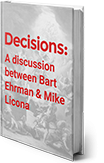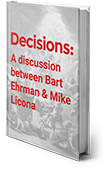Peter Pan Theology
“I just think that God let’s us come to Him in our own way. He does not require us to believe in the Christian God, the Muslim God, or any specific God. So when you to say that unless I believe in your God I am going to Hell, you claim that your beliefs are better than mine and that is judging.”
Postmodern liberalism may sound liberating and enticing to its adherents, but it may be no more than a 21st century fairy tale for the uncommitted adult.
In 1995, a public debate occurred between Christian philosopher, William Lane Craig, and the liberal New Testament scholar, John Dominic Crossan. Dr. Crossan stated that when everything is considered the issue is not which religion is correct, but “Where do you find your God?”(1) For Crossan, choosing a religion is a matter of personal preference. When you choose and follow a god, then he, she, or it becomes god to you; that is, your god will provide comfort, peace, encouragement, hope, and sometimes even healing.
For Dr. Craig, although one’s delusional god may bring benefit in this life, the question concerning whether or not one’s god is the true God may very well determine where and how one will spend eternity. This is the much bigger question.
Craig responded that Crossan’s view was not new. A very famous person had held the same beliefs: “All it takes is faith and trust, and just a little bit of pixie dust. Now think of the happiest things. It’s the same as having wings. You can fly! You can fly! You can fly!”(2)
Peter Pan theology, while at home in Western culture, is irrational. Why should you get up early on a Sunday morning and go worship someone who isn’t really there? If Jesus was not who he claimed to be, then he is a false prophet. If that is the case, let’s all go home and forget about him.(3)
One does not have to believe in a god to embrace Crossan’s views. The former Beatle, John Lennon, was also a follower of Peter Pan. In his catchy song, Imagine, he writes,
Imagine there’s no heaven
It’s easy if you try
No hell below us
Above us only skies
Imagine all the people living for today
Imagine there’s no country
It isn’t hard to do
Nothing to kill or die for
And no religion too
Imagine all the people living life in peace
You may say I’m a dreamer
But I’m not the only one
I hope someday you’ll join us
And the world will live as one.
John Lennon, Dr. Crossan, and Peter Pan are not the only ones who hold such a view. In terms of religion, those who proclaim the view popular in our postmodern culture, “What’s good for you is good for you and what’s good for me is good for me” are also living in Never-Neverland. If the Christian view is correct, Jesus said He is the only way.(4) In this case, no matter how tolerant and peacemaking Peter Pan theology may sound, it will ultimately end in judgement for those who embrace it. The person high on drugs may believe he can fly when he jumps off the top of the sky-scraper, but if he jumps, he will quickly find that what’s good for the sober person is also good for him. For Lennon, he may have imagined no heaven and no hell. Such imagining, however, does nothing to change the fact of their existence.
Now, of course, if one is looking for peace in this life only and has no concern for what happens after death, then I suppose he or she is rational to believe whatever he or she desires, irrespective of whether or not those beliefs are true. For those who desire peace in this life as well as security in terms of their post-mortem existence, then there are more important questions to ask than Crossan does: Does God exist as a real person and has He, She, or It revealed Himself, Herself, or Itself to mankind? And if so, what has God said?
We must seek the answers to these questions with all fervor and honesty. If God does not exist, then let us escape to Never-Neverland. However, if the Christian view is correct, then let us put aside all thoughts of this fairytale land, keep our feet on the solid ground of reason, and our knees bent in humble worship of our Lord Jesus.
Footnotes…
1. Paul Copan, ed. Will The Real Jesus Please Stand Up? (Grand Rapids: Baker Books, 1998), p. 38.
2. Ibid., p. 32.
3. Ibid., p. 44.
4. John 14:6. His disciples made the same claim about Him. See Acts 4:12; 1 Timothy 2:5; 1 John 5:9-12.





